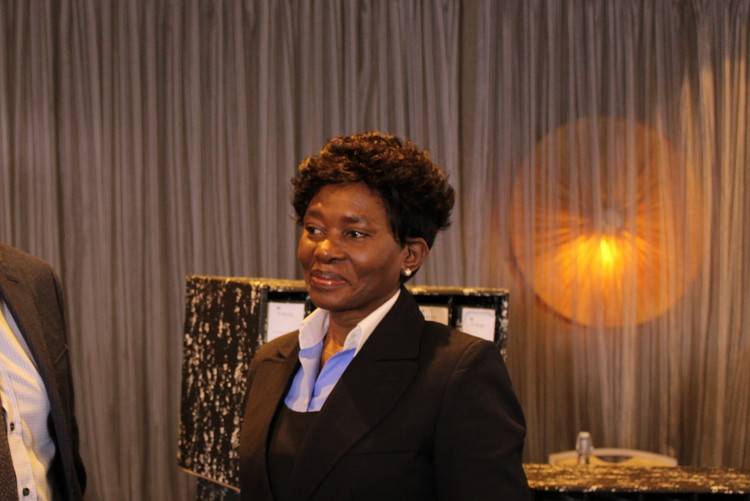
Judge Nana Makhubele could face impeachment after a Judicial Conduct Tribunal found her guilty of misconduct. (Archive photo: Masego Mafata)
A judicial conduct tribunal has found Judge Nana Makhubele – who chaired the interim board of the Passenger Rail Agency of South Africa (PRASA) after being appointed as a judge in Gauteng – guilty of gross misconduct.
The tribunal, chaired by retired KwaZulu-Natal Judge President Achmat Jappie, has also found her conduct as the chair of PRASA’s interim board to be equally unethical.
The tribunal’s findings – which could result in Makhubele’s impeachment – will now be considered by the Judicial Service Commission (JSC).
The tribunal was established by the JSC to consider two complaints by commuter activist group #UniteBehind.
- Part A: she sat as a judge at the same time that she was chair of the PRASA interim board.
- Part B: she had also involved herself in state capture in connection with matters involving the Siyaya group of companies. In particular she authorised, in an alleged “secret settlement deal”, payments from PRASA to Siyaya of R56-million while sidelining PRASA’s internal legal team.
Read the ruling (PDF, approx 7MB)
On Part A the tribunal had to consider two conflicting versions: the evidence of Gauteng Judge President Dunstan Mlambo and that of Makhubele.
Mlambo claimed that Makhubele had never told him that she had accepted the PRASA job (a week after she was named as a successful judicial candidate following the JSC interviews in October 2017).
He said when she failed to report for duty on 1 January 2018, he had summoned her to his office. At that meeting, attended by deputy judge president Aubrey Ledwaba, she had said she had to wrap up cases she was involved in as an advocate and her duties at the Water Tribunal.
Makhubele, however, said this meeting only happened later because Mlambo had already previously agreed that she would assume judicial duties in April 2018.
Mlambo denied this.
The tribunal, in its findings, said Makhubele’s version was “most unlikely”.
“It is the view of this tribunal that this conversation and agreement that the respondent claimed to have had with Mlambo to the effect that he knew that she would not be able to commence her duties on 1 January is most unlikely.
“Her evidence on why she seemingly owed allegiance to the Water Tribunal and the manner in which she was unable to finalise her unfinished court matters in order to free and ready herself for [judicial duty] was equally unconvincing, improbable and unreliable,” the tribunal said.
It leveled the same criticism to her evidence on how she became the chairperson of the interim board of PRASA.
“She said she simply handed her CV to a neighbor and waited until she received congratulatory messages from various sources. She said the appointment was only for four months, but this is contrary to the contents of her actual letter of appointment by the Minister of Transport.
“On the credible evidence it remains that the respondent (Mahkubele) did not assume her judicial duty on 1 January 2018 as per her appointment and did not inform Mlambo that she had, in fact, accepted the PRASA board appointment.
“Her version of events was deliberately misleading and it was unambiguously insufficient as an explanation for her conduct to cast any doubt on the credible version of Mlambo. She has made herself guilty of gross misconduct.”
On Part B – relating to her conduct during her tenure as chairperson of the Prasa – the essence of the complaint from #UniteBehind was that she had acted in a manner unbecoming of a judicial officer, making her unfit to be a judge. She had acted in a dishonest and unethical manner.
In summary, the tribunal said this was related to her handling of four claims brought by the Siyaya group of companies which PRASA had been vigorously defending.
The board allegedly took a resolution to settle these claims. There was no record of this decision.
The decision was conveyed by Makhubele to Francois Botes, an advocate who was on brief for Siyaya.
There were several interactions between Botes and Makhubele including a physical visit by him to her offices. She provided Botes with correspondence that assisted Siyaya in obtaining default judgment against PRASA.
Evidence in this complaint was given by Martha Ngoye, PRASA group executive of legal, risk and compliance, Fani Dingiswayo, general manager of legal services, Diale Mogashoa, an external attorney handling the Siyaya matters on behalf of Prasa and Botes.
Ngoye and Dingiswayo testified that Makhubele had marginalised the legal unit, terminated the mandate of PRASA’s attorneys and personally appointed another firm of attorneys in their stead.
She then negotiated with Siyaya’s attorneys and entered into a confidential settlement agreement that was manifestly and materially prejudicial to the interest of PRASA, and frustrated PRASA’s attempts to resist the enforcement of the settlement.
The tribunal said while Makhubele challenged their evidence, she presented no counter evidence.
“Her evidence in chief and in cross examination was not only confusing but rather difficult to follow. She was inclined to introduce new evidence and matters which were irrelevant.
“On the evidence before us, the version was intrinsically problematic. It was inconsistent and amounted to a bare denial in the face of vastly credible evidence.”
The tribunal said it was not known who had given Makhubele a mandate to settle the Siyaya matters and to allow default judgment to be taken against PRASA.
But it noted that when the Minister of Transport asked for a report on it, “she unexpectedly resigned and failed to give such a report”.
Once the default judgment was rescinded, no further action was taken by Siyaya in pursuit of these alleged claims. In fact, the Siyaya Group was eventually liquidated.
The tribunal said the credible evidence was against Makhubele. Again it found her guilty of gross misconduct.
This article was first published by GroundUp.